
How to Overcommit Responsibly by Anika H. '26
sidequesting like a pro
With how many cool opportunities, classes, clubs, people, makerspaces, traditions, and shenanigans that happen around MIT on a daily basis, it’s easy to stretch yourself thin.
You’ve all seen the graph- social, academics, sleep (pick two).
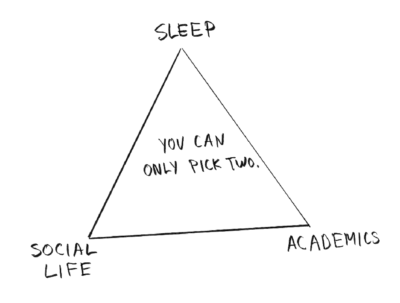
Right now I have all three – a wonderful group of friends I hang out with regularly, decent grades, and 8+ hours of sleep per night, but that’s because the triangle is an oversimplification of sorts.
Many of you new frosh just finished character customization this fall, and it’s important to understand the mechanics of the game you’ve just started playing. For those already halfway through the College gameplay, this can also be a good refresher. Some of the following is specific to the MIT server, but most can also apply to other servers of the game.

Overview
Quests: Most of you all have the same primary quest: to graduate with a degree. There are also a number of subquests for the main quest, like degree requirements, and a nearly infinite sidequests, like learning a new skill, doing research, or building an awesome project.
HP and MP bars: Physical and Mental points. It’s the amount of energy you have to spend at any given moment, is proportional to the product of these two bars. So if you’re physically sick or mentally exhausted, you won’t be able to do much. When your MP and HP drop below a certain threshold, regular quest completion will start becoming way more difficult.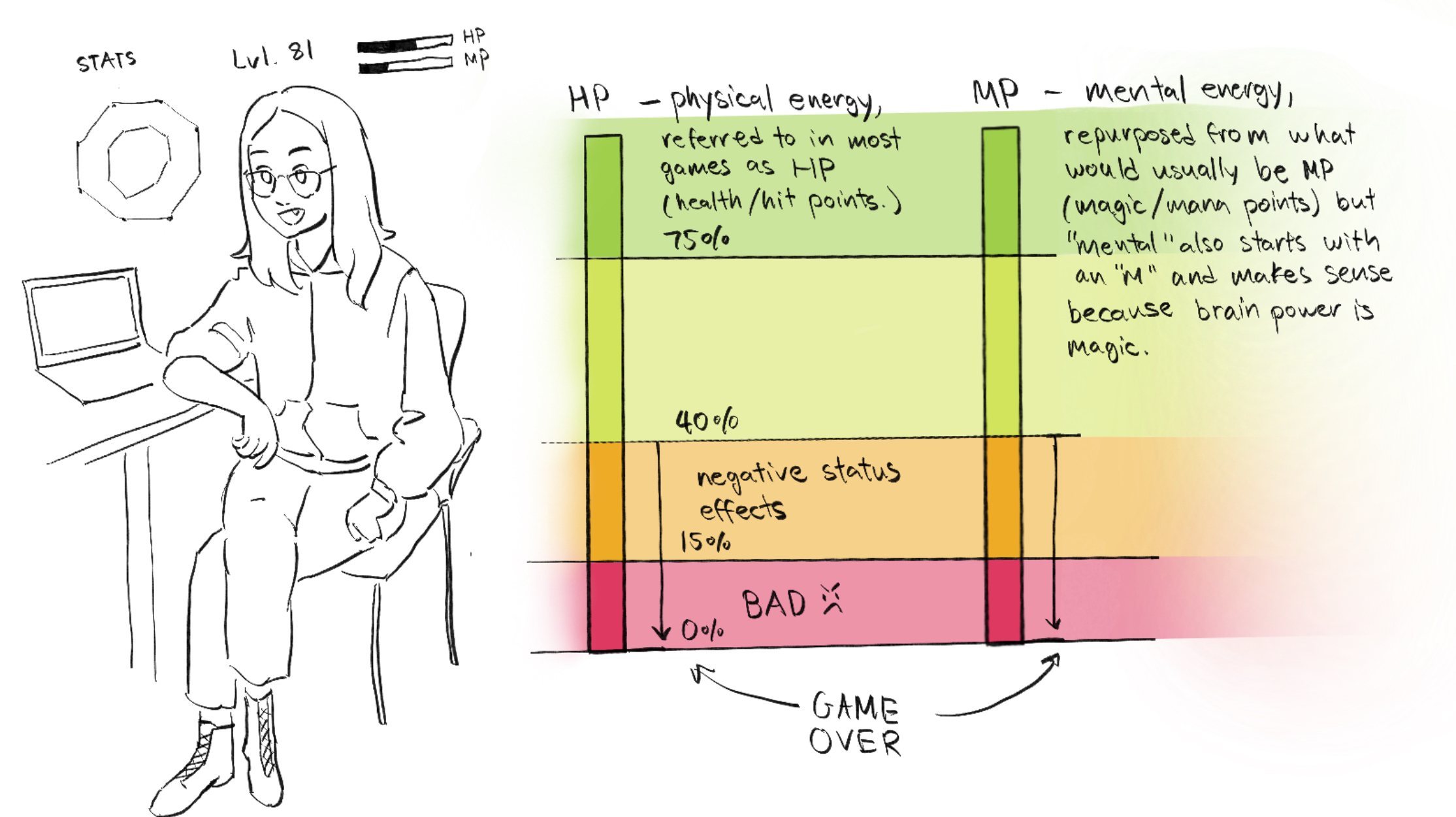
Base stats: This is the part I mentioned before. To simplify massively, you have academics, social life, sleep, hobbies/extracurriculars, career, hygiene/housekeeping, fitness, miscellaneous. Each of these have several subbranches. You have a set number skill points to distribute among all of these, but everyone has a slightly different amount of stuff they can handle. Your skill points are not how good you are at something, but rather a measure of the amount of time and energy you spend on something. If you decide to put all your points into academics for example, all of your other stats will suffer as a result. Skill points can be redistributed at any given points throughout your four years in the game.
The miscellaneous category are the things you do when you are not actively spending time in any of the others, like daydreaming and doomscrolling. I try to minimize my skill points in this category, but as much as I hate to admit it, I have more points than I would like here.
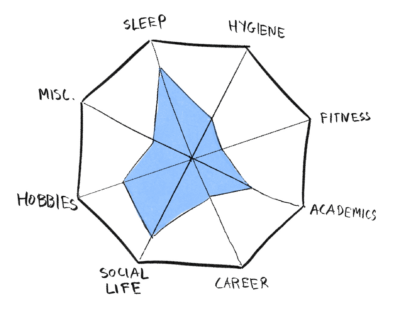
an example of what a skill point distribution chart could look like.
Status effects: Status effects impact the ability of your character to perform in game. There are a few positive ones (buffs: ex. motivated, well-rested) that can be gained by maintaining both your HP and MP, and negative ones (debuffs: ex. stressed, hungry, sick) once your HP and MP dip below a certain level. You can also be hit with random status effects once in a while (hyperfocus, rumination). These can be long term or short term, easy or hard to manage, and you may be stuck with some for a while.
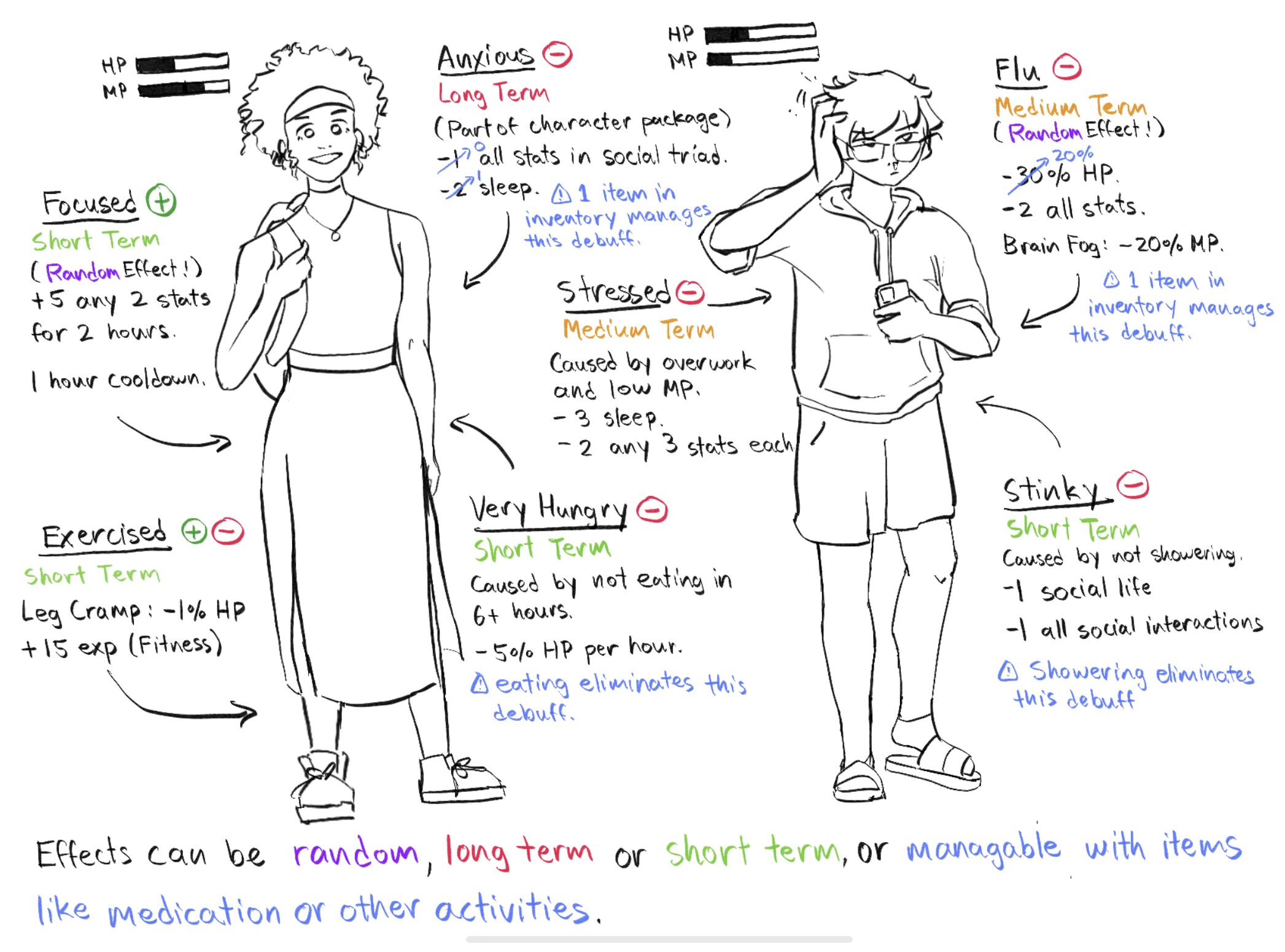
Downtime, Pauses, and Game overs: If HP or MP reach 0, you trigger an automatic game over (you die). I think this goes without saying, but automatic game overs are bad and should be avoided at any cost, including incurring a secondary game over. The primary quest of the game is defined by the player, and as such, secondary game overs for different people have different conditions. For example, if your main goal is to graduate, you trigger a game over when academics hit 0. If your main goal is to make friends, game over happens if your social life hits 0.
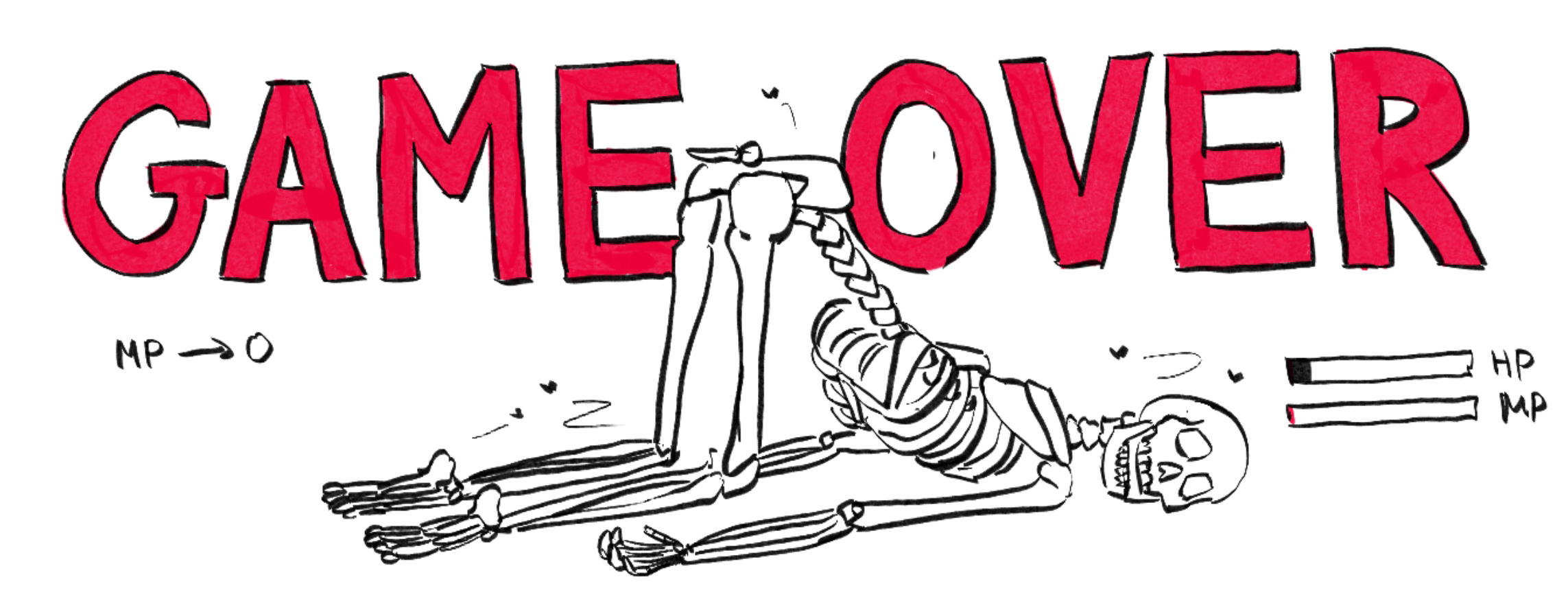
an automatic game over
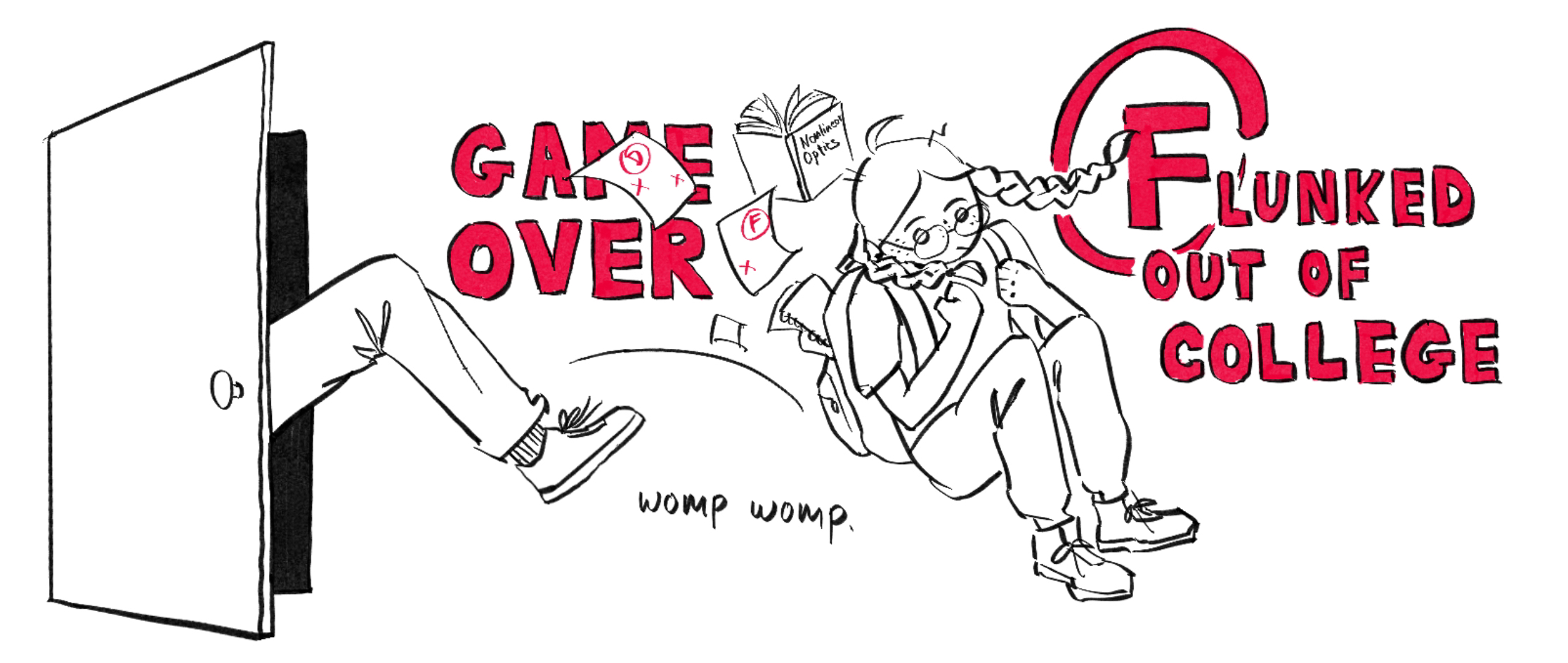
an example of a secondary game over
Pausing the game can be helpful if your HP or MP fall too low and you need to recover. Built in game downtime happen during long breaks, summer, and IAP (Independent Activities Period) when there is less pressure to maintain many of your stats. If you need a longer pause, you can request a leave of absence from moderators. If your academics dip below a certain level, you may also be asked to pause the game.
Extensions: Because many of the regular quests have time limits, you’ll likely need to get an extension at some point for an assignment. If you have a physical or mental debuff affecting your ability to complete your quest by the deadline, you can ask Student Support Services, affectionately referred to as S^3, to support your request.
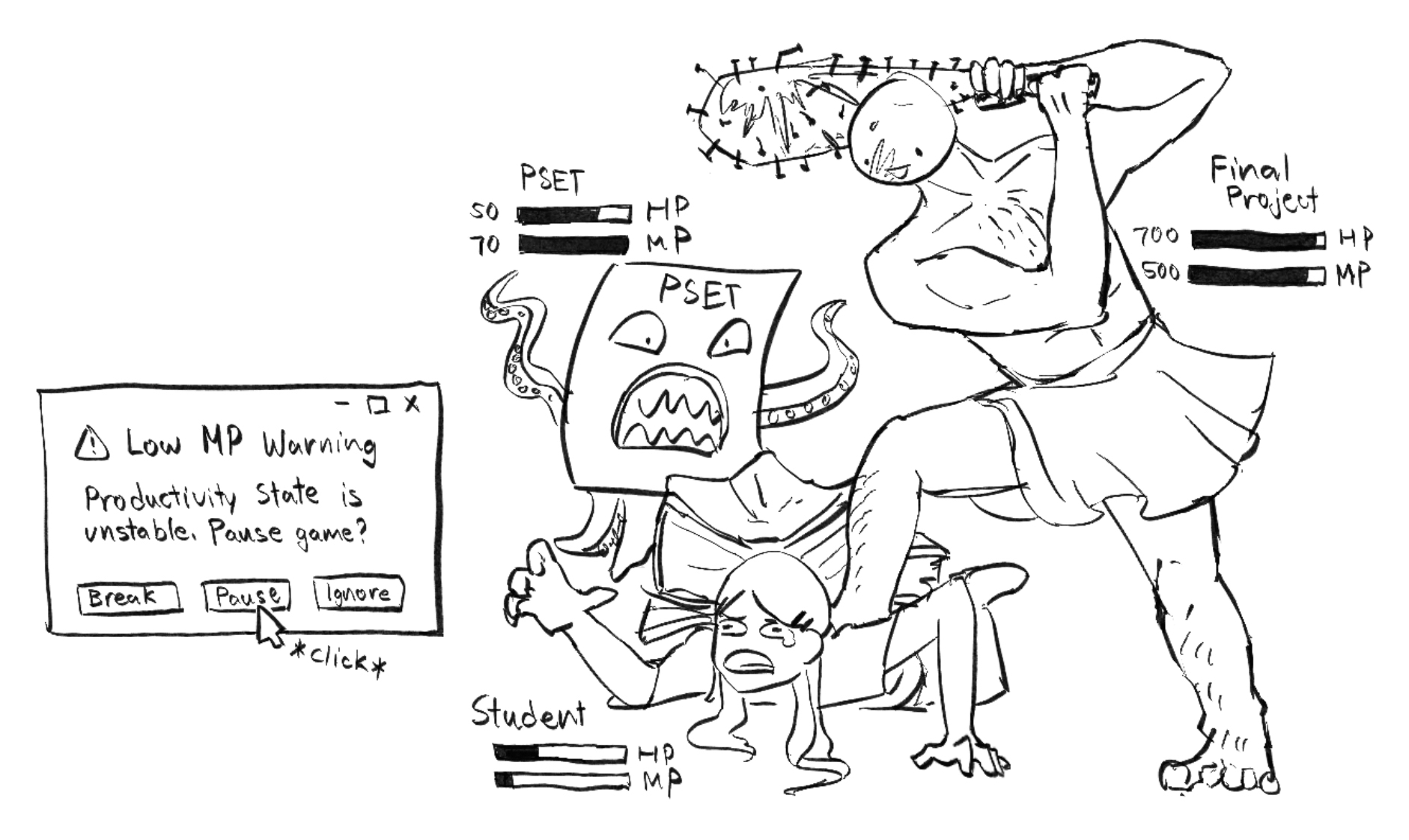
it’s nice to pause the game when you need to
By playing the game well, you can gain skills and experience applicable to future volumes like the career series.

General Strategies
The game of College allows for a lot of freedom in gameplay, but that can also be the most difficult part. For many newer players, even with the Pass/No Record mod in your tutorial stage for the first semester, making all your own decisions and experiencing the consequences, be it good or bad, is a huge adjustment. This game is not meant to be easy, and you will eventually be hit with an overwhelming number of quests on top of having to maintain your HP and MP.
The min-maxxer: This strategy is not recommended unless you are 100 percent sure which expansion of the career volume you are going to play next and you’re optimizing for skills and exp that will be particularly beneficial when that comes. But keep in mind, this is minimally sustainable, and your playthrough of the current volume may not be very fun.
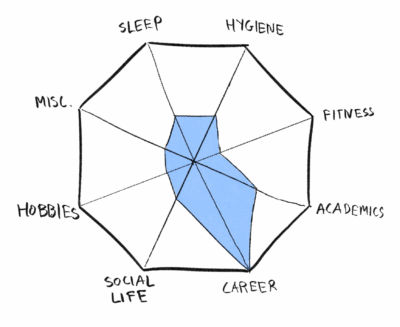
min-maxxed
The well-rounder: Solid strategy for most people. By evenly distributing your energy, you can guarantee graduation and a relatively enjoyable experience. For example, 6-8 hours of sleep a night, 4 classes per semester (2 technicals), 2 clubs, and 1 UROP or part time job will leave a reasonable amount of time and energy to spend on other stats that can help maintain HP and MP.
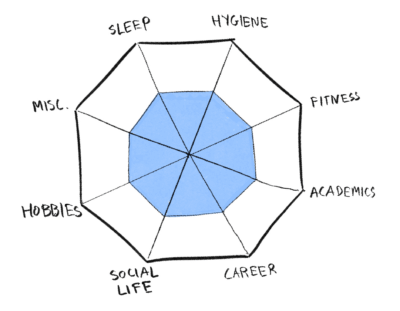
well-rounded
The overcommitter: This is somewhere in between the two strategies above and roughly what I’ve been doing. It’s the hardest one to execute, and only recently did I somewhat manage to find a balance that works for me. Overcommitting hinges on sacrificing stats for others. In my playthrough, I have optimized for skills and exp and maintaining my HP and MP at a level just high enough to not incur too many debuffs. I have 3 technical classes, 1 HASS, 2 UROP/part time jobs, 3 high commitment clubs, 3 low commitment clubs, and get 8 hours of sleep a night. This leaves me very few points to spend on all my other stats. Decide the order of stats from which you are willing to sacrifice points. Pick some that you are not willing to sacrifice, and some that you would allow to fluctuate. For example, I would much rather take points away from fitness and housekeeping than take points away from my social life. As a result, I still can’t do a pull-up and my room perpetually looks like a broken laundry machine exploded inside.
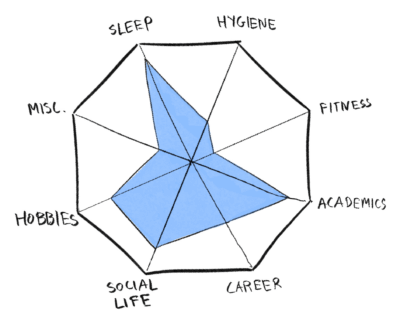
an optimistic view of what my stat circle looks like
My Current Playthrough
Since the start of my playthrough, I have gotten much better at organizing my quests and managing stats and debuffs. And in general, I think I am less of a mess than I used to be. I have a few of my own rules when it comes to distributing stat points and keeping up with quests.
Sleep is non-negotiable: After a taste of getting 8 hours of sleep a night, I can never go back to surviving on 4. Back in freshman year, when I was regularly pulling all-nighters and not getting enough sleep, I was falling asleep during lecture and work. It will cause the phenomenon I’m sure many of you have experienced, where you read one line of words 15 times because your brain isn’t parsing any of the information. You’ll end up wasting far more time being tired than you have saved not getting sleep. If you have an exam the next day, DO NOT stay up all night reviewing information. Even if you have not studied at all for the test, you should skim and practice what you can and get at the very minimum 4.5 hours of sleep. Not getting enough sleep also locks me out of certain sidequests like firespinning and using heavy machinery in a makerspace, since both of these require at least 4 hours of sleep for safety reasons.
Lectures are mostly non-negotiable: I don’t skip them unless the timeliness of a PSET is on the line, I have gotten less than 5 hours of sleep, someone I know is dying, or my dorm is on fire. I’ve learned that I don’t always have the self discipline to catch up on lectures that I’ve missed, so attending makes sure I actually learn the material before I get left behind.
Social life is also important: This will not be the case for everyone, but I absolutely need social interaction to keep me sane, which is why I chose to live in Tetazoo, a living group where everyone is fairly close. In the two years where East Campus closed and everyone got scattered, my MP crashed for a while, and I migrated until I inevitably ended up sleeping where my friends are. Now, because I live with my friends and therefore eat and work in the lounge around them, spending time with them doesn’t actually take time away from any of my other activities. As such my skill points in social life are far higher than they would be otherwise. Regardless of whether you have many friends or not, building a solid support system will be very important in completing the game.

sleeping is the best way to restore HP and MP.
Physical health (HP): If it is sufficiently debilitating, you should not try to work through sickness. You will be much happier and much more productive at the end of the week if you just spend a day sleeping it off and taking care of yourself. Use s^3 to get extensions.
If you are sitting down to work for a long time, make sure you start with as many debuffs cleared as possible. Here’s a checklist of the common ones:
- Have you slept enough? If not, take a short 20 minute nap.
- Is your hunger satiated? If not, grab a snack or a full meal if possible.
- Are you hydrated? Regardless, chug some water and fill a bottle or a mug.
- Have you gone to the bathroom? Go piss girl.
- How long have you been working? If you have already been working for a while, take a break if time allows for it.

Mental health (MP): Individual people will care about your mental health, but the game and your class syllabus do not. Your professors and TAs will usually be more lenient with deadlines if you talk to them. I have learned that as much as MIT has changed the existing system to accommodate for mental health, it is still far easier to get extensions if you have a cold than if your brain is trying to kill you. S^3 will often offer to connect you with plenty of resources and spend some amount of time listening, but will refuse to support your request until you are just short of actually dying. (in my experience at least, this may not always be true). That being said, if you have a serious crisis and you explain it to them, they will help talk to your professors about the situation and advocate for leniency.
I have learned that as long as I’m still functioning and my health bars are not at 0, I have to keep running, because time will not stop for anyone. However, if you would like an option other than stupidly powering through things like I do, I would suggest treating MP like HP and taking breaks when necessary. A playthrough where you maintain and recover MP regularly through breaks will be far more enjoyable than one where you deplete it and start stacking debuffs. Some debuffs like burnout get particularly annoying to clear. Trust me, I would be taking this route if I started the game over again, but hindsight is always 20/20.
Sidequesting: I mentioned before that I try to keep my stats out of the miscellaneous category, which is why I spend time sidequesting so much. When I can’t bring myself to focus and will just end up staring at a screen, I will climb a tree, blog, spin fire, string a guitar, or make something in a makerspace. Among other things, I’ve also gotten CPR certified and I am one class away from getting my pirate’s license. A common pitfall though is feeling guilty or stressed because “I’m supposed to be working right now” or “my PSET is due in two days”, but that will actually slow down your MP and HP recovery and be counterproductive.
That being said, the game you are playing is meant to be an experience, if you spend all of your time grinding for EXP and not having fun, you’ll miss out on a lot of important gameplay that helped College gain such a large playerbase.
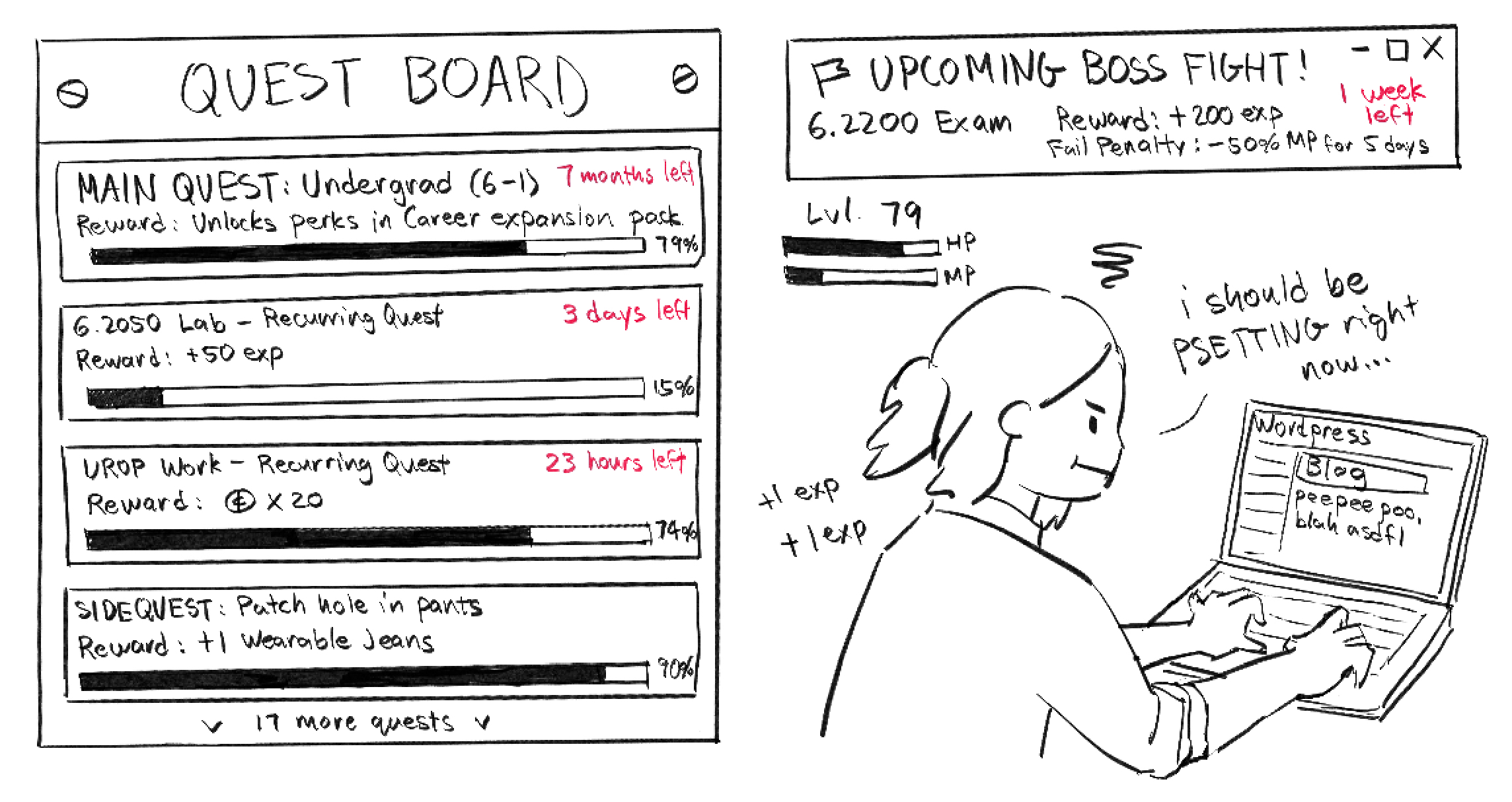
in-game screenshot i just took
Quests and Events: I have always had trouble focusing and keeping organized, but I have eventually learned to work around it. For scheduling, I can’t make myself use google calendar, so I screenshot my class schedule on hydrant and annotate it with regular events. For any one-time events, I use a terrible combination of writing in my notebook, sending myself discord messages, checking my email a lot, and just straight up remembering from the stress of its impending inevitability. It’s objectively a terrible system, but it works for me and I don’t plan on changing it. It takes time, but you should also figure out organization that works for you.
It is normal to be bad at the game when you first start it, but if you keep your HP and MP up, you’ll be unlocking new skills and leveling up in no time. Happy questing!
